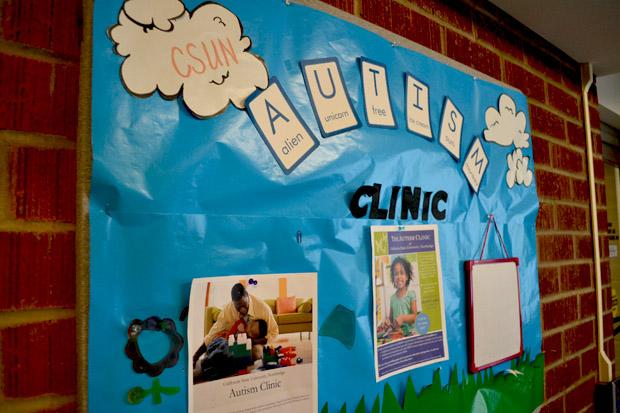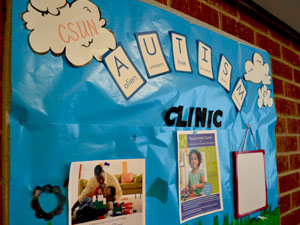
On the corner of Zelzah and Nordhoff Street, hidden behind the G4 parking structure lies Monterey Hall, a brick building that houses CSUN’s autism clinic.
Graduate students pursuing their master’s degrees in behavioral clinical psychology conduct research to further their studies in autism.
“You will never have improvements in the field without doing research,” said Amanda Finch, 22, a master’s student in behavioral clinical psychology. “The only reason that the field has gotten to where it is, is because of research that has been done in the past. It’s always evolving and improving, so without facilities such as these that would not be possible.”
At no charge, CSUN graduate students work with parents in the community that have children with autism. They provide interventions based on the principles of the applied behavior analysis (ABA). They also use naturalistic intervention strategies based on ABA.
The clinic is currently servicing five children between the ages of 5 and 8 years old.
The students can help the clients of the clinic with behavioral problems, as well as skill acquisition.
“Children with autism often learn differently than typical children. It’s just teaching them skills that they may have a deficit in,” Finch said. “They might not know how to understand emotion, they might not know how that you are supposed to say hi to somebody when they first walk into a room. We use behavior analysis to teach these skills and also simultaneously decreasing behavioral excesses.”
The students start with assessing the child to determine what field they may need help in. The child is taken into a room where standardized tests are administered. Skills, such as social initiation and reciprocal commenting, can be tested. From the results, the students can figure out what intervention program will fit best with the child.
“We are taking extensive data that can be used to run a research project where we can add to the literature and hopefully improve the field and get others to know our literature,” Finch said.
While the undergraduate students who participate in activities at the clinic are volunteering their time, the graduate students are there to complete their supervision hours. Graduates have to complete roughly 1,000 hours.
Graduate student Ivette Zubiate, 24, has two siblings – a sister and a brother – who are autistic. They drove her to become a student in the behavioral clinical psychology field.
She has been in the field for about five years.
“The main reason I wanted to work in the autism clinic is because we do research, and the research that I wanted to participate in is finding effective interventions for children with autism and also conducting best practices and interventions that are current,” Zubiate said.
Parents normally bring their children to the clinic once a week but are welcome to come more often. According to Finch, the clinic provides supplemental help to other programs that the children and their families already receive.
“We want parents to walk away knowing some strategies to work on outside of the clinic. We just want to give kids an opportunity to be able to interact with their peers and parents,” Finch said.
Due to confidentiality reasons, most students will not get the chance to visit the clinic that lives inside Monterey Hall. Most will not have the opportunity to pay a visit to the brick building that houses the students who put so much time and research into helping those with autism and expanding the field.






